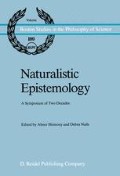Abstract
Ecological epistemology has a strong affinity to phenomenology, particularly the version of Merleau-Ponty (as Reed, 1983, points out). There is a common emphasis upon the richness of experience, the irreducibility of perception to sensation, the importance of proprioception, and the inseparability of valuations from presentations. Ecological epistemology, however, is more dedicated than phenomenology to a controlled, experimental study of perception, and pays closer attention to the physics of the interplay between the perceiving subject and the environment. James Gibson’s demonstration of the intricacy of this interplay constitutes a permanent contribution to experimental psychology, even if he was not as successful and as revolutionary in solving traditional epistemological problems as Reed has claimed.
Access this chapter
Tax calculation will be finalised at checkout
Purchases are for personal use only
Preview
Unable to display preview. Download preview PDF.
References
Reed, Edward S.: 1983. Two Theories of the Intentionality of Perceiving, Synthese 54, 85–94.
Rorty, Richard M.: 1963. ‘The Subjectivist Principle and the Linguistic Turn.’ In George L. Kline (ed.), Alfred North Whitehead: Essays on His Philosophy. Englewood Cliffs, N. J.: Prentice-Hall.
Shimony, Abner: 1965. ‘Quantum Physics and the Philosophy of Whitehead,’ In M. Black (ed.), Philosophy in America. London: Allen and Unwin. (Reprinted in R. S. Cohen and M. W. Wartofsky (eds.), Boston Studies in the Philosophy of Science, vol. 2. New York: Humanities Press, 1965.)
Whitehead, A. N.: 1928. Symbolism: Its Meaning and Effect. London: Macmillan.
Whitehead, A. N.: 1929. Process and Reality. London: Macmillan.
Whitehead, A. N.: 1933. Adventures of Ideas. New York: Macmillan.
Author information
Authors and Affiliations
Editor information
Editors and Affiliations
Rights and permissions
Copyright information
© 1987 D. Reidel Publishing Company
About this chapter
Cite this chapter
Shimony, A. (1987). Comment on Reed. In: Shimony, A., Nails, D. (eds) Naturalistic Epistemology. Boston Studies in the Philosophy of Science, vol 100. Springer, Dordrecht. https://doi.org/10.1007/978-94-009-3735-2_13
Download citation
DOI: https://doi.org/10.1007/978-94-009-3735-2_13
Publisher Name: Springer, Dordrecht
Print ISBN: 978-94-010-8168-9
Online ISBN: 978-94-009-3735-2
eBook Packages: Springer Book Archive

